How to Become a Content Creator
In this blog post, we’re going to cut straight to the chase and zoom in on what it actually takes to
- become a content creator
- what specific skills and tools you need
- what jobs and salaries are out there for you
- how to go solo as a freelancer or solopreneur
- what handful of formats you need to master
and then finally - how can you - and why should you - become a content creator yourself.
Let’s jump in!
My name is Rued Riis. I am a full-time content creator - teaching courses and doing YouTube.
Yes, that’s possible - even with a relatively small following.
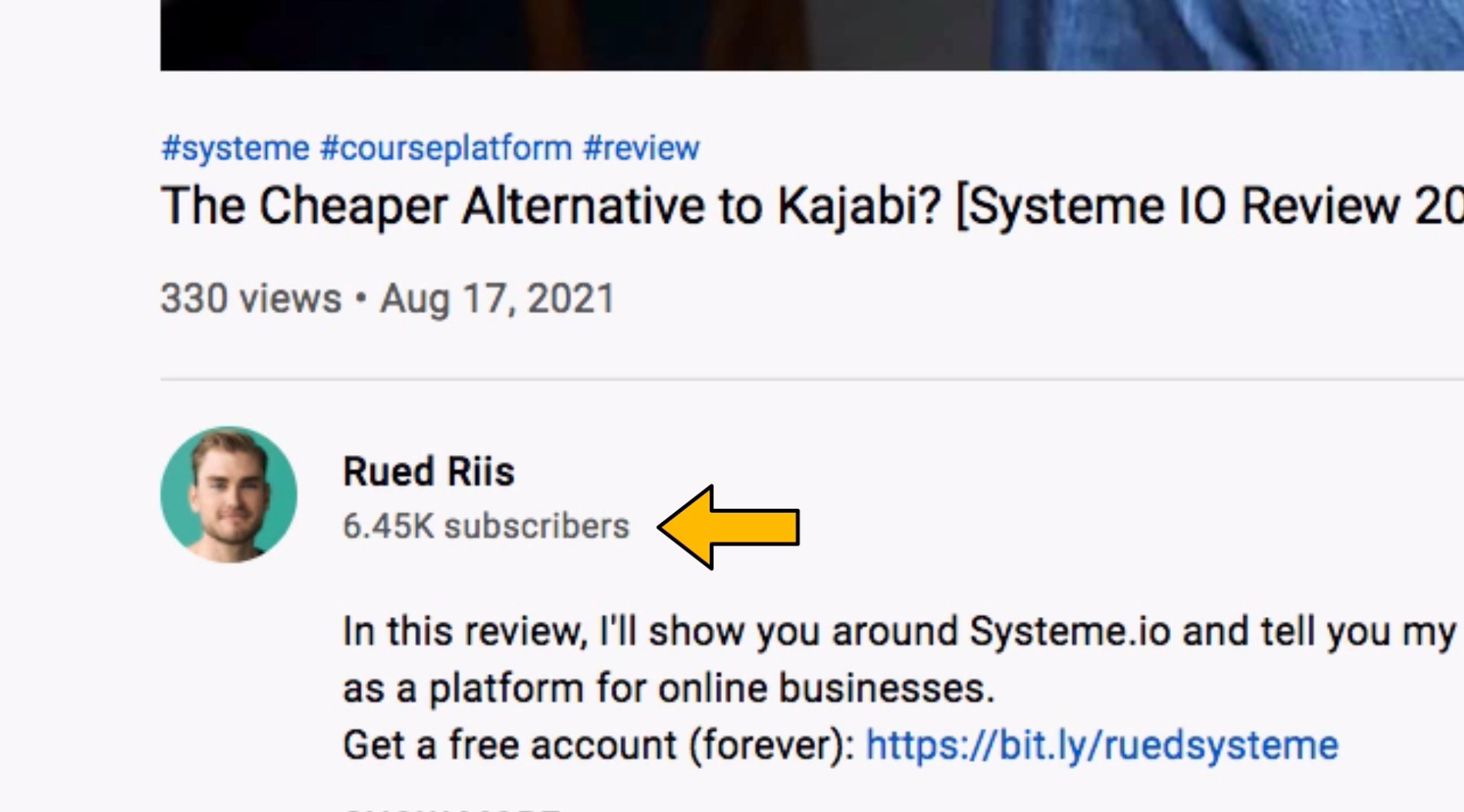
Last month I hit $10.000 dollars for the first time, but it took years to get to this point.
With that experience, I now wish to share with you how I see the landscape of content creation and what’s needed to do it well enough to be able to make a living from your own creativity.
Contents
Is Content Creator a Real Job?
How do Content Creators Make Money?
How to Become a Content Creator?
What is a Content Creator
A modern content creator is someone who creates "informational, educational, and entertaining content to be shared and distributed through digital channels."
Put simply, content is a piece of designed information shared through a medium - like YouTube, Instagram, TikTok, or your own website.
For a business, examples of content creation can be videos for their LinkedIn profile, banner ads shown on magazine websites, articles for their industry blog, newsletters emailed to their customers - and pretty much any other communication activity that doesn’t happen face-to-face.
Then you need some kind of material that tells your story for you, and that’s content.
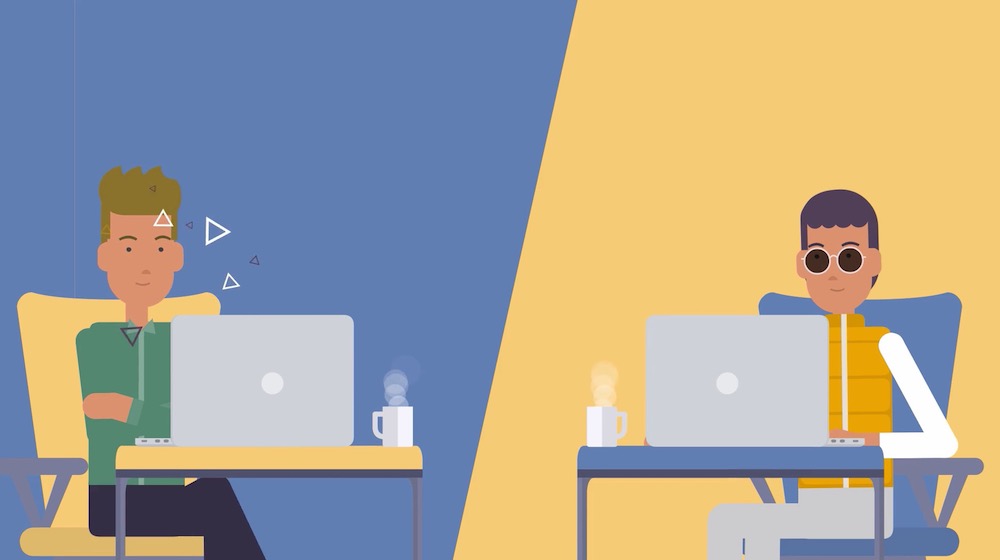
A content creator is then the PERSON who writes the blog post, shoots the video, designs the banner ad, or sends out that newsletter. A digital generalist.
In rough terms, you can be a Content Creator in 2 ways; either you work for someone else, or you work for yourself.
Let’s first look into the jobs and salaries you can get as a content creator employed by a company.
Is Content Creator a Real Job?
Yes, it certainly is. You only have to click around LinkedIn jobs for a few moments to realize that there is an abundance of companies that offer high-paying content creation jobs - all over the world.
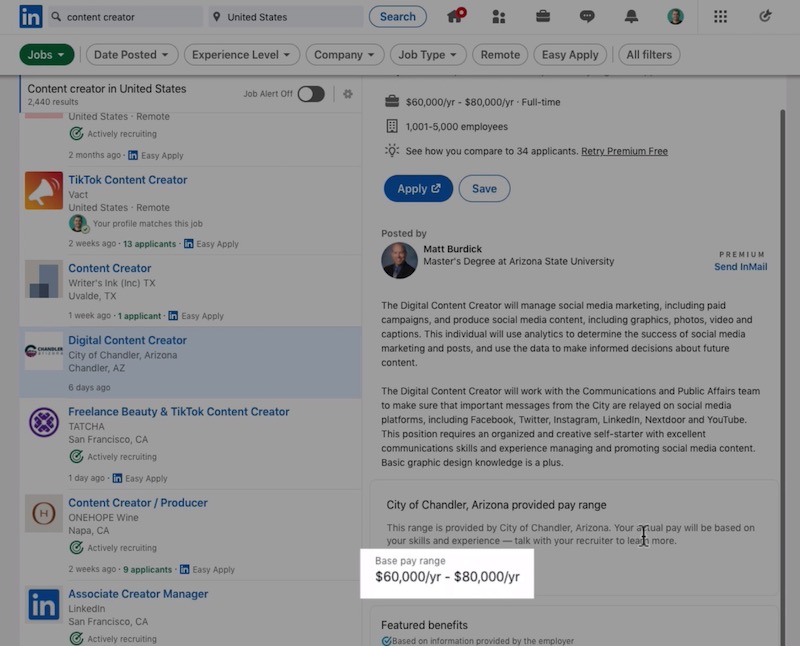
Even as a happy solopreneur, it’s enough to make me circle around that apply button..
But what does it take to land such a job? What are the job requirements?
I’ve gone through a lot of Content Creator jobs, and some of the most frequent requirements are
- Creativity: the ability to come up with ideas, together with other teams and based on
- Research: both general research on a topic, but also concrete keyword research to figure out what terms and topics to target with your
- Storytelling: how to string together an engaging story and make it come to life via
- Copywriting, photography, video or audio production. Oftentimes, you need a bit of experience with all these formats and show it in your
- Portfolio: have examples of your work. All recruiters want to see what you’ve made in the past and photo make sure you have an
- Eye for detail: Brands want content that’s on-brand - using the right logos, colors, and fonts, so you need to be super attentive to detail with everything you post on
- Social media: recruiters want you to know the platforms in and out, what works, what doesn’t. You need to be a digital native.
Lastly, they often mention your ability to collaborate as a requirement.
This is important for any employee, and much more so than for a freelance content creator.
I’m not that good at that last requirement, so I’ll probably just stay unemployed. I’m probably unemployable at this point..
...
If you are like me, and love to work for yourself, being a free bird, juggle your own projects and all that stuff, then you want to be an INDEPENDENT Content creator.
To put things very simply, - again - there are 2 ways of doing this.
How do Content Creators Make Money?
The two main ways to make money as a Content Creator who’s NOT employed anywhere is to either freelance (sell yourself) or to be a.. let’s just call it YouTuber (sell something else).
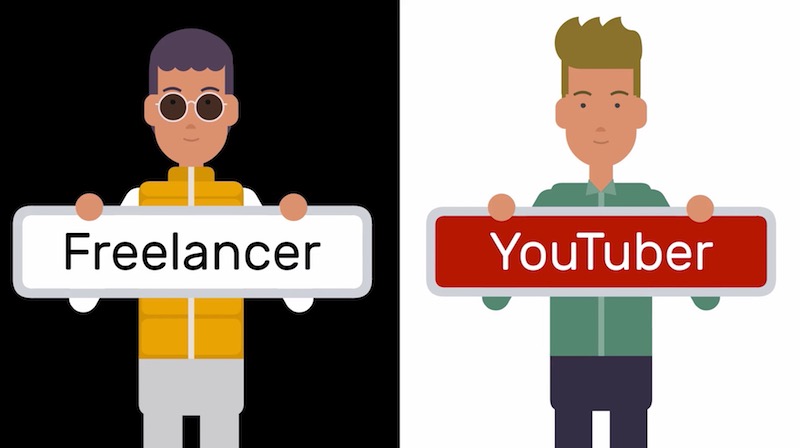
I call myself a solopreneur because I run a company of one - and not only on YouTube but mainly on YouTube. So let’s just say I’m a YouTuber.
The difference is that freelancing means selling your skills to companies. You charge per hour or per project - for making an explainer video for a startup, for example. That’s freelancing.
The YouTuber, on the other hand, tries to build up an audience and then offer that audience something extra they can buy if they want.
I offer video courses and coaching - and sprinkle that with some brand deals, where I’m paid to talk about someone else’s product, and then link to those products with affiliate links, where I get a small commission if someone buys.
Freelancing and YouTubing can easily be combined - YouTube is a great place to attract clients - and freelance projects make you a better creator, which benefits your YouTube game. I combine the two worlds and make half of my revenue from each thing.
SO:
Now we know what a Content Creator is, where one finds jobs and how some create their own job.

But to get there, there are a number of skills and formats you need to master.
Boring right? Mastery.
But learning just a handful will enable you to produce content for any platform in any context.
How to Become a Content Creator?
The key is to master the right skills and formats. As you know by now, I like to simplify; so, there are only 5 formats you need to worry about. Text, graphics, sound, photo, and video.
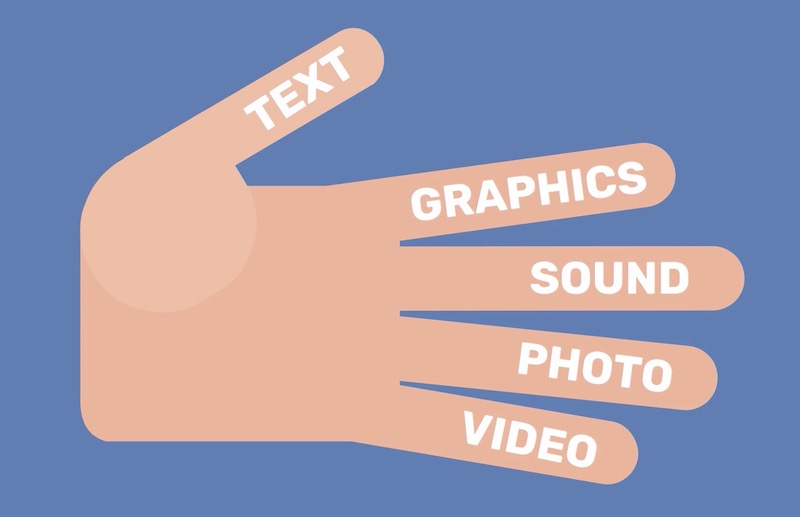
If you manage to get your hands on these 5 ingredients, you’ll be able to bake up any content cake you can dream of - no matter the platform.
TEXT
Putting together words, texts, it’s called copywriting. You don’t just use it for blog posts and newsletters - it’s also something that goes along with your videos when you post them on YouTube or the pictures you post on Instagram.
GRAPHICS
It’s not about becoming an artist - it’s just about developing that aesthetic eye that enables you to design an ebook, or create a Thumbnail for your videos. Color, composition, hierarchy - all that is more important than what tool you use.
SOUND
Not only podcast production, but sound is also a voice-over that goes into your video, or a recording of a colleague that talks to the camera. Learn the basics of how to get a quality recording and how to edit it afterward.
PHOTOS
Learn how to level up your iPhone game, or figure out how to take photos in manual mode with a camera. When a new colleague joins your company, when a thumbnail needs a crazy photo, or when a new product goes on social.
VIDEO
Last but not least, the format that incorporates all of the above. Scriptwriting, motion graphics, voice-overs, camera handling - it’s all part of making a strong video. That’s why I think video is a great type of content to pursue learning - because it prepares you for all the rest.
Those were the 5 formats to learn.
I hope you still have your hopes up around becoming a content creator. It might sound daunting at first, but with modern tools and a solid process, it’s actually easier than ever before, from a technical standpoint.
If you want me to teach and guide you on your journey towards your full-time content creator career, consider joining the Content Creator's Academy.
Now:
Let’s quickly run over the tools I use for each format - and the process that binds it all together.
What are good Content Creator Tools?
The very best tools I know for content creation are the ones I've used for years — and still use to this day.
For text, I use Grammarly. It catches my spelling mistakes, but not only that - it also suggests better formulations, when my sentences get a little too complicated.
For graphics, I use Canva or Vyond. I made my latest workbook in Canva, but I design my thumbnails in Vyond. But, as I said earlier, your eye for design is more important than the tool.
For photos - I have a simple camera, Canon M50, and I edit my photos using Mac’s built-in Preview application to adjust crop, colors, contrast and brightness. Simple and fast.
For video, I edit my projects in ScreenFlow. Not because it’s the best editing tool, but because I often use screen recordings in my kind of content - and because it’s so simple to use.
It crashes sometimes..
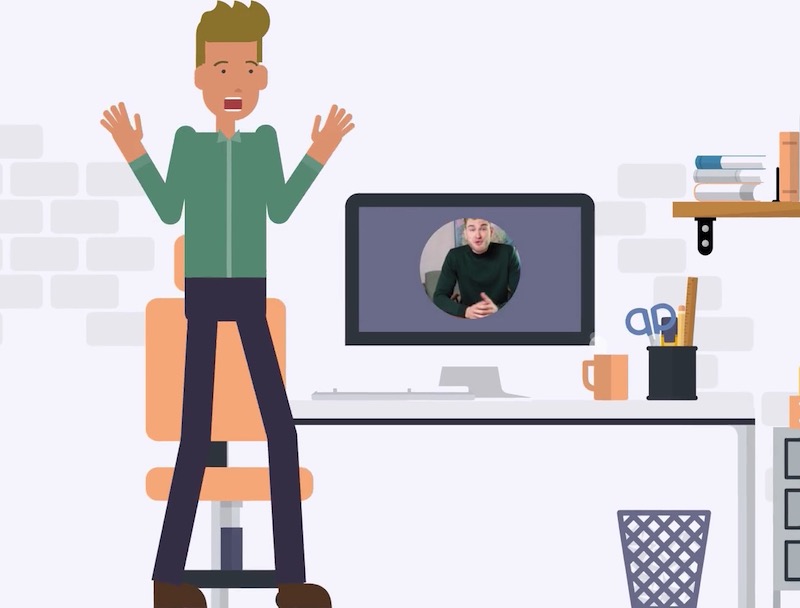
But that keeps it exciting, I guess.
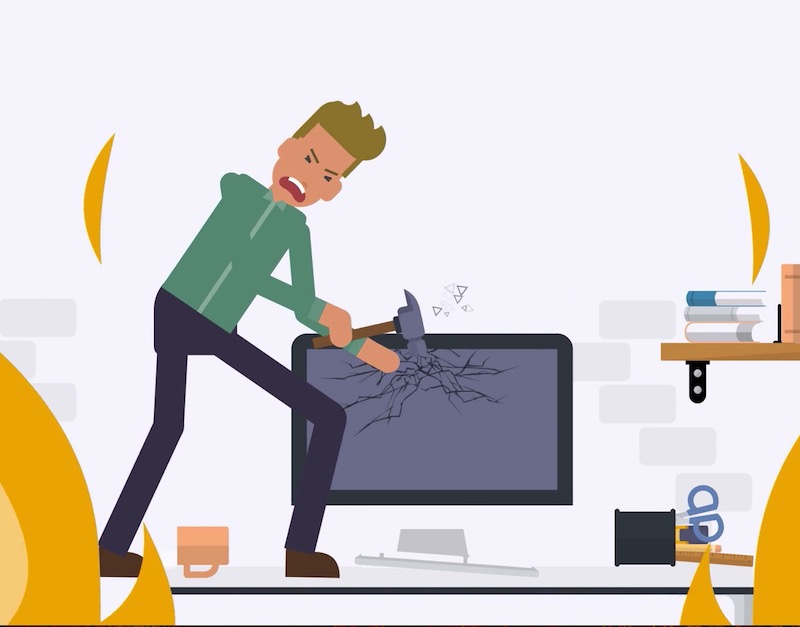
Those were some of my tools - now onto the process. I actually made a whole video about my SRV process, so go ahead and watch that video afterward to learn how to Script, Record, and Visualize your way towards a final piece of quality video content.
So much to take in, I know.
If you’re just getting started as a creator, you might be wondering if it’s even worth it? Why even pursue this kind of career?
Why become a Content Creator?
We’ve all heard it: In the next few years, AI and robots are going to change the job market completely, right?

“In time, almost all humans may work to amuse other humans, while robots run competitive primary industries, like food production and manufacturing.” — Hans Moravec

That’s one reason to be a Content Creator. That you’ll also have a job in the future, where your job is to educate and amuse other humans.
Besides job security, content creation lets you scale yourself and your positive influence on other people.
You can speak to a global audience if that’s what you want. With no limits to where and when you can work.
You can travel - see the world. Meet new people. And all of that is enabled by a job you love - that’s fun and rewarding to your own life and the lives you touch.
And it’s NOT too crowded or too late to start. True effort gets rarer and rarer, so no matter how crowded and competitive you think the content creator landscape looks, there’s always room for great creators.
Who can be a Content Creator?
Today, anyone with the right skillset can become a content creator. Either as a freelancer, an employee, a YouTuber, or some other form of CC.
When people think of content creators, they often think of young social media influencers. That's not the only type of content creator, and you can easily be a content creator who is middle-aged and teaches how to use Excel on YouTube.
And with the tools and resources that are available online, there's also a very low barrier of entry. With a simple subscription to a tool like Vyond, you can start making animated videos in a matter of a couple of hours.
The only limitation is then your internet connection. Then you can buy a used camera, and start posting beautiful pictures on your Instagram account. The sky is the limit, so use your imagination to figure out, what kind of content creation your want to be.
How to Start Content Creation
The best way to start your content creation is to choose your preferred format; text, sound, images, or video.
Then, you want to find your preferred gear/software for creating this format; a camera, your phone, a microphone, a computer.
From there, it's all about making, sharing, learning, and repeating that cycle. Write a blog post, share it on your website, read the comments and make the next one better.
Or shoot a video, share it on YouTube, show it to everyone you know to get feedback, and use that information to make next week's YouTube video even better.
That's how you start to develop the skills and the processes around content creation, so you become great at conveying your message and sharing it with the world.
Content Creator for Instagram
On Instagram, you need to focus on photos and video. Before, Instagram was only about photography and still pictures—but today, Instagram Reels and general video posts are a big part of the social platform.
To grow, you've got to have that aesthetic eye for what works for both individual posts as well as the "wall" you have on your profile. If visitors see an impressive portfolio of posts, then check out a few that are great as well, they are much more likely to follow you.
Instagram is focusing a lot on its Reels; vertical videos of about 10-30 seconds, typically. This is a format to master if you want the advantage of an algorithmic boost due to the newness of this format.
I posted 10 Reels over the course of 1,5 weeks. I got a couple of thousand views in total, but that wasn't the point. The point was to learn more about how to create content for Instagram. And the best way to learn is to just make something, share it, get feedback, adjust and repeat.
Content Creator for YouTube
YouTube is all about video, so that's the format you want to focus on. Although thumbnails are a big part of why people click, and why you need to also master graphic design to a degree, your primary focus should be on how to produce great, helpful, entertaining video content.
YouTube is notorious for long-form videos, but lately, with their YouTube Shorts, you are enticed to publish shorter videos in the vertical format and share them on this new part of the platform.
As YouTube is owned by Google, you might also want to invest in skills around SEO - search engine optimization. From how you write your description and title to how you tag your videos—it's all part of how the algorithm views and indexes your video for people to find it.
Find out what people are searching for in your niche, create high-paced, high-quality videos that answer those questions, and you'll be off to a good start.
If you want me to teach you what I've done and learned over the course of my online career, take a look at the Content Creator's Academy.
To become a great content creator, you gotta love what you do. Creating videos is probably my number one thing. I love it.
And I think that affection needs to be at the core of your content creation journey in order to get that job, land that client, or sell that course.
And soon enough, you’ll discover that as a content creator, you hold the key to an exciting life making a living using your creativity.
That's it for now. Hope you'll consider becoming a content creator, and that this blog post helped shed light on what it actually is.
Join 2000+ educators
who took my free mini-course
When you join below, you get my free email class "Explainer Experts" on how to create high-quality, educational videos.








